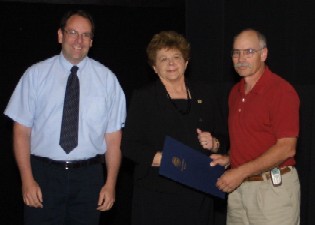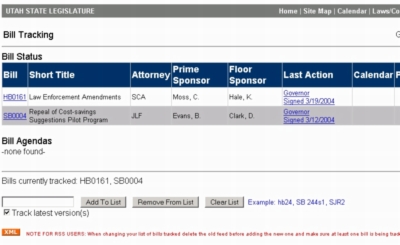The National Association of Legislative Information Technology (NALIT) will be sharing "Web Tips, Tricks and Techniques" for building Legislative RSS feeds at their 2004 Professional Development Seminar in beautiful Burlington, Vermont, September 8-11, 2004. Panelists include key IT players from Virginia, Nevada, and Utah. Several states are now using RSS to provide users with notices of new Web content or to distribute newsletters. At least two states are now generating legislative feeds directly from databases. This article previews some of what they'll be showing from the states of Texas, Utah, Wisconsin, and Rhode Island.
NALIT is the IT working group of the National Conference of State Legislatures. The recent annual meeting, July 19-23, 2004 in Salt Lake City, was hosted locally by Mark Allred and his IT staff from the Utah Office of Legislative Research and General Counsel. Marty Stephens , Speaker of the Utah House of Representatives and President of the National Conference of State Legislatures, presided. Linda Pittsford, Manager of the Texas Legislative Council Computer Center, gave a presentation introducing "Leveraging RSS Technology" for searching news.
This time around panelists Sharon Crouch Steidel, Director of Information Systems, House of Delegates, Virginia and Andy Harvey, Webmaster and Internet Services Administrator of the Nevada Legislative Counsel Bureau, will examine how to make news available via syndication, which RSS format to choose, and other tips and potential uses for RSS by legislatures.
Glen Johnson, Utah Office of Legislative Research and General Counsel, will then demonstrate how the Utah Legislature is using RSS. Glen has created a legislative news feed and Brooke Anderson, a programmer with the Legislative IT Staff, has tied into the Legislature's SQL database to provide RSS feeds for bill tracking and committee calendaring.
 Brooke and Mark Allred recently received the Utah 2004 CIO Award for Digital Democracy from Governor Olene Walker for their "Online Tracking of Legislation" system. This utility made tracking the 693 bills and resolutions of the 2004 session a more managable task. The RSS syndication features have been added since the award.
Brooke and Mark Allred recently received the Utah 2004 CIO Award for Digital Democracy from Governor Olene Walker for their "Online Tracking of Legislation" system. This utility made tracking the 693 bills and resolutions of the 2004 session a more managable task. The RSS syndication features have been added since the award.
The bill tracking facility now creates custom feeds for the bills of interest to the user. The feeds provides links to the bill text, sponsor, bill status, floor calendars, and relevant committee agendas and minutes.

The legislative committee watch list provides a check list allowing users to pick and choose committees of interest. For example, if you wanted to keep informed about interim committees in between legislative sessions, you could select just those, and it creates a custom feed linked to by the orange xml icon at the bottom of the page ![]() . The feed that you receive provides up-to-date links to agendas, minutes, and committee documents.
. The feed that you receive provides up-to-date links to agendas, minutes, and committee documents.
RSS innovations from other states that will be showcased at the NALIT seminar include:
Texas
The Texas Legislative Counsel has created RSS feeds for upcoming legislative calendars, committee meetings, schedules, and feeds for bill text, fiscal notes and analysis,
During the past four years, Utah and about half the other states have cooperatively developed State Government Information Locater Services. Within this group of states, about eight, with the assistance of the State of Washington State Library, have developed search engines using Microsoft Site Server technology. I noticed today that Rhode Island has joined Oregon, Utah, and New Mexico in having their state portal powered by their State Library's Find-It search. Rhode Island, in fact, pioneered the use of MS Find-It. It was their Secretary of State's Office and State Library that sponsored the original Find-It programming that was later shared with us and other states. This spirit of cooperative open source development continues.
Rhode Island, under Jim Willis, their Director of eGovernment for the Secretary of State, has recently won several awards for outstanding open source egovernment innovations. It's great to see how their PHP/mySQL CMS is used to power their press releases. Like Rhode Island, Utah is a NIC state, and local affliate, Utah Interactive, Inc., is developing open source RSS technologies for press releases.
Utah also has agencies experimenting with the Zope application server and Plone CMS. They have been greatly impressed with Texas Governor Rick Perry's application of Zope/Plone at his website.
The Hawaii Information and Communication Services Division is using this same technology for their new intranet portal and has a video presentation of their project.
Oregon joins these state in promoting the use of open source in state government as evidenced through their legislature's proposed Open Source Software for Oregon Act (House Bill 2892).
Former Utah CIO, Phil Windley, has been promoting the use of Open Source this week at the Washington, DC eGovOS conference and his presentation and running commentary at his website is highly recommended.